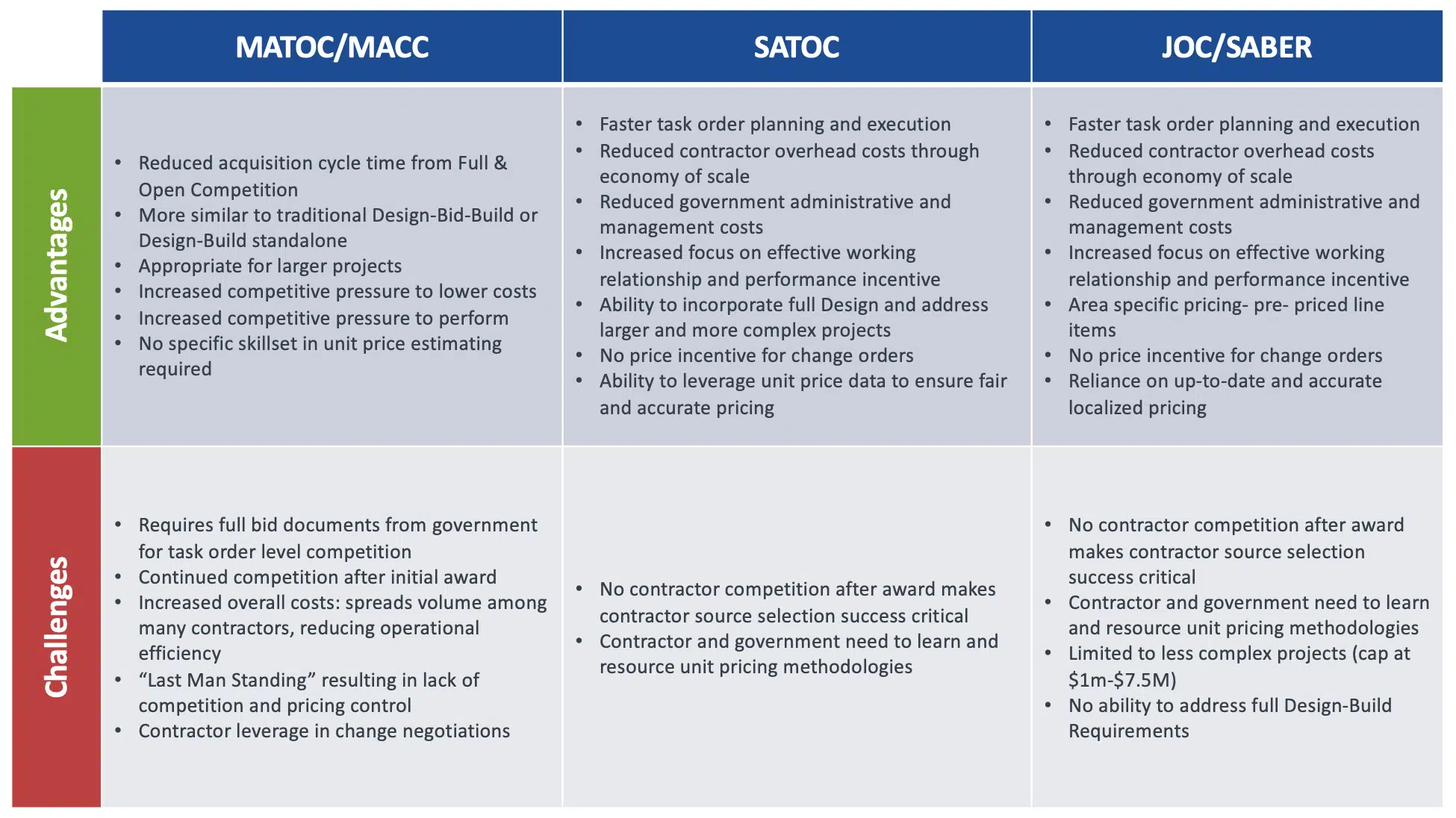Indefinite Delivery Indefinite Quantity (IDIQ) contracts are responsible for the majority of DOD and Federal construction projects. But how does an agency decide which IDIQ methodology will serve their needs best? More specifically, how do they choose between single award and multiple award IDIQs?
In this piece, we’ll quickly touch on high-level definitions of different single award and multiple award IDIQ contracts before discussing the advantages of each.
MATOC (Multiple Award Task Order Contract)/MACC (Multiple Award Construction Contract)
Many IDIQ construction contracts are multiple award. In a MATOC, agencies issue an RFP and typically select contractors based on qualifications. Multiple awardees may be chosen to provide services to the government within a pre-defined dollar amount. Usually, this is a one-year contract with the option for two or more additional years.
MATOCs enable agencies to set up a master contract through which they can issue individual task orders. There is normally a limit to the number of contract holders, which limits competition for each task order to a pre-qualified set of vendors. Selection of the contractor for each task order can be made based on price alone or based on a best value process. MATOCs can include Design-Build capabilities, though some agencies require a two-step selection process in alignment with the Brooks Act when design services are incorporated.
These contracts fall under Title 41 and the Federal Acquisition Regulations (FARs) emanating from it, requiring “fair opportunity” at the task order level, meaning that every contractor must have an opportunity to compete for every task order.
A MACC is simply a MATOC that is specifically for construction as opposed to services or other activities.
SATOC (Single Award Task Order Contract)
With a SATOC, construction is solicited through a negotiated IDIQ procurement on a Single Award Task Order basis. Under the terms of the solicitation, a single contractor will be selected to perform task orders, which usually include minor or major design.
The single-awardee approach of a SATOC requires a mechanism for establishing fair and reasonable pricing, and a Unit Price Book (UPB) is a preferred way to accomplish that. SATOCs offer structural flexibility for construction program execution, including a formal Design-Build approach.
Job Order Contracting (JOC)/Simplified Acquisition of Base Engineer Requirements (SABER)
Job Order Contracts are a specific subset of SATOCs defined under the Army and the Air Force’s FAR supplements (the Air Force refers to JOCs as SABERs). Unlike SATOCs, JOCs must rely on a UPB and a competitively bid coefficient – sometimes also called a factor, adjustment factor or multiplier – which adjusts the cost of items in the UPB so that the contractor can earn a profit.
JOC UPBs include a comprehensive collection of detailed repair, maintenance and minor construction task descriptions or specifications with units of measure and pre-established unit prices for each of these discrete tasks. The contractor’s evaluation of the prices in the UPB and the resulting coefficient are critical to the pre-award competition.
Each JOC is awarded through a competitive process, typically following a Request for Proposal that includes price, relevant past performance and technical factors. The contract value is expressed as a range from a pre-established minimum amount to a maximum dollar amount. Work is accomplished by issuing a series of individual task orders to the contractor.
The value of a JOC task order can be limited. The Air Force provides a guidance cap of $1 million per task order, while in the Army the task order is tied to the delegation of authority, which now enables JOC for certain projects up to $7.5 million. There is no task order value cap for federal agencies.
Comparing Features of Single Award and Multiple Award IDIQs
Each of the five single award and multiple award IDIQ contracts described above has features that DOD and federal agencies find appealing. They also have their weaknesses. The table below details the advantages and challenges of using each contract type. Knowing the advantages of single award and multiple award IDIQs, as well as their limitations, is essential to make sure you’re receiving the best bang for your buck and avoiding process headaches.
Plenty of Room for All IDIQ Contracts
Both single-award and multiple-award multiple- and single-award contracts have their place in DOD and federal construction procurement. MATOC and MACC can be the best choice when project requirements are complex, projects are well-resourced from an engineering end and contracting perspective and timelines are not urgent. But they require significant overall volume to support a large pool of contractors.
SATOC and JOC are the best choice for renovation and repair (Sustainment, Restoration, and Modernization) work, projects or programs where speed is critical, and agencies that may be under-resourced.
Choosing correctly between single-award and multiple-award contracts requires contracting officers to carefully consider the particulars of construction projects on a case-by-case basis.








